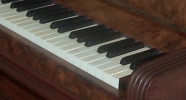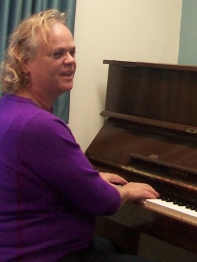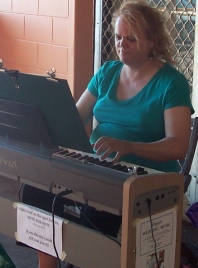piano, music theory, keyboard harmony
piano solo, piano accompaniment. Perth, Western Australia
www.piano.mixmargaret.com


| Mix Margaret Dylan Jones |
The Piano Pages
ON THIS PAGE:
Piano Lessons
Are you looking for a highly skilled and experienced piano teacher? One with musicality, enthusiasm and excellent communication skills? If you are, then please read on.
Since 1981 I've taught piano to a very wide range of students. I teach mainly classical piano, but some of the young children or beginner adults play original music in rock, pop, and blues styles composed by the Bastien couple or Christopher Norton. And sometimes they play my own (classical) publications, especially my educational music.
I have studied three or four completely different styles of piano technique (you know, bent fingers, open fingers, totally straight fingers, use of weight etc etc), and have had seven piano teachers. The first two years of my university degree were in piano studies. My formal qualifications mainly relate to piano, theory, and composition, and the teaching of these.
I teach children and adults, from about the ages of 7 to 70. (Teaching very young students under 7 is a specialisation I haven't developed.) Sometimes the adults have learnt before and have resumed piano studies after decades of neglecting it, and sometimes they're complete beginners. Contact me if you would like lessons for yourself or your children.Materials Used
I like new students to bring along to the first lesson any music books they already have. If possible I will use some of their books and other materials. We might also use some other books which I have found over the years to be of great benefit in teaching.
Please note in regard to the use of materials: 1) I can't say in advance exactly which, if any, new books you'll need; 2) if I purchase them for you the cost will be put on the subsequent month's account.
Of course, which books a teacher uses is not nearly as important as how they use them. I frequently give great lessons using unfamiliar materials brought to lessons by students, materials I've never seen previously.
Some of materials I find useful for the early studies are:
Students don't need to have this many books, of course. But these are the sorts of things I use most often.
- Bastien: Pop Piano Styles, Sonatinas, Notespeller, and other titles
- Christopher Norton: Micro Jazz, and other titles
- John Thomson: Note Speller, Scale Speller, Chord Speller
- Dulcie Holland: Master Your Theory
- Diller and Quail: Pedal Studies
- Joan Last: Freedom Technique
- Piano Dexterity for Beginners (a big improvement on Hanon Finger Exercises)
- Jump Right Ins: piano starters and re-starters (fun pieces focused on co-ordination)
Good resources for the intermediate levels:
Students at the higher levels have a wide range of repertoire, depending on the student's interests. Some of the more likely:
- Higher level books of Bastien, Norton, Holland, Diller and Quail, Last
- The Joy of Bach
- The Joy of Classics
- Bach: Inventions
- Clementi: Sonatinas
- Bartok: Mikrokosmos (a few selections)
- Grieg: Lyric Pieces
- Exam repertoire from the grade books
- Colourfast Piano Music (grade one)
- Scenes from Gorillahood (grades 3-5)
- Studies (Etudes) by Bertini, Heller, Le Couppey, Burgmüller, Duvernoy
- ColourKey Piano Technique
- Brahms: 51 Exercises (but not all 51!)
- Dohnanyi: Essential Finger Exercises
Actually, I don't teach the works by Roger Smalley and Stephen Benfall. I just publish them (and I love hearing other people play them). Have a look at my one-page piano composition, The Greedy Row Snake, which is in the AMEB's Grade One piano exam book (Series 12). For my other pieces, see my page at Hovea Music Press.
- Bach: Preludes & Fugues, Little Preludes, suites
- Mozart and Haydn: sonata movements
- Beethoven: sonata movements
- Brahms: late piano miniatures
- Debussy: easier pieces and studies
- Ravel: minuets
- Shostakovich, Kabalevsky, other Russians
- Albeniz: Espana (a few selections)
- Margaret D. Jones: Sonatina
- Smalley: Barcarolle (advanced); Variations on a Theme of Chopin (very advanced)
- Benfall: Hammers (very advanced)
- Chopin: Preludes, Studies
- Brahms and Dohnanyi exercises
- Exam repertoire
Learning with a Keyboard or Electric Piano
I used to be dead-set against teaching anyone to play the piano who didn't have access to a real piano. But then I had several students do so well with electric instruments that my attitude has changed.
I took on a few people with keyboards or electric pianos because they seemed keen. In one case I correctly guessed that money was so tight that a cheap keyboard was the only answer, and the parent's dedication and the young man's interest overcame my usual reluctance. He was one of my best students.
While we're on the subject of keyboards, have a look at Piano Howlers (no link yet).
So, if YOU have an electric instrument, give me a call.
I'm in Morley, a suburb of Perth, Western Australia.
Mix Margaret D. Jones
The
Piano Pages
Accompaniment
Music
for venues
About
Old Pianos
Piano
Lessons
Theory
at the KBD
The Singing Site
Reviews
& Resources
About
Me
My
Qualifications
What's an androgyne?

How to tune,
repair etc
your old piano
eBooks &
Free Reports
Find your piano's
Age & Value
The Singing Zone
Per Bristow's
home study
voice method